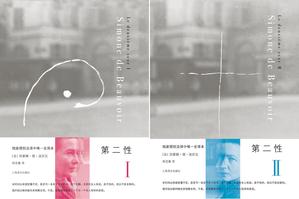 Book covers of Simone Beauvoir's The Second Sex, translated by Zheng Kelu. (PHOTO PROVIDED TO CHINA DAILY)
Book covers of Simone Beauvoir's The Second Sex, translated by Zheng Kelu. (PHOTO PROVIDED TO CHINA DAILY)
Zheng Kelu, the Chinese translator of French masterpieces by Victor Hugo, Alexandre Dumas, Stendhal (the pen name for Marie-Henri Beyle) and Simone Beauvoir, died aged 81 on Sept 20.
In his translation, Zheng Kelu dared to use rarely used Chinese characters in a hope to make his readers turn to the dictionary and therefore expand their knowledge and vocabulary
As a professor at Shanghai Normal University's school of humanities, Zheng was widely recognized for his translations, teaching and research.
In his six-decade career, Zheng translated around 60 French literature and social science works, and published 11 monographs and 10 textbooks.
ALSO READ: Ruling in realm of imagination
Thanks to his endeavors, Chinese readers were able to appreciate many classic French works of literature including Les Miserables, La Traviata and Le Comte de Monte-Cristo.
Zheng's translation of Beauvoir's representative work The Second Sex won the Fu Lei Award for Translation and Publication in 2012. The prize is sponsored by the French embassy in Beijing to reward Chinese translation of French literature, humanities and social science works.
He finished translation of all Hugo's novels last year, at the age of 80, according to Beijing Daily.
Zheng said in a lecture in Shanghai last autumn that the novelettes and short stories of Hugo he translated at the time had laid the foundation for the great writer to create Notre Dame de Paris.
"Chinese readers often overlook the psychological description of Hugo's characters, but actually it's brilliant and reaches a peak in Les Miserables," he says.
The textbooks of foreign literature history, French literature and poem histories Zheng wrote are widely used among domestic students majoring in literature, and he promoted the establishment of the major of comparative literature and world literature at SNU.
Born in Macao in 1939, Zheng was the great-grandson of Zheng Guanying (1842-1922), industrialist and advocator of modernized reform during the late Qing Dynasty (1644-1911).
Zheng Guanying was the first to use the word "constitution" in Chinese and the first to propose that Shanghai should hold a World Expo to boost trade and economy.
Zheng Kelu was fond of Russian and French literature since high school and later studied French at Peking University from 1957.
After graduation, he worked at the Chinese Academy of Social Sciences, led by late poet Bian Zhilin (1910-2000). During the "cultural revolution" (1966-76), he spent more than a year reciting the French-Chinese dictionary, because it was the only learning material available.
He was then able to read original French works. He annotated more than 80 novels of Honore de Balzac's The Human Comedy. His debut translation work was Balzac's The Elixir of Life, published in 1979.
Zheng went to SNU in 1987. That year he was rewarded Ordre des Palmes Academiques (an academic Golden Palm medal) from the French Ministry of Culture.
He said in an interview with Shanghai Observer in November that the key to a quality translation lies in how to deal with sentence patterns, especially relative clauses that don't exist in the Chinese language.
He emphasized polishing language use and concluded his translating style as concise and fluent while being literarily graceful.
In his translation, he dared to use rarely used Chinese characters in a hope to make his readers turn to the dictionary and therefore expand their knowledge and vocabulary.
He chose not to retranslate Romain Rolland's Jean-Christophe as he thought he would not go beyond Fu Lei's classical version. He also turned down the request to translate Marcel Proust's Remembrance of Things Past for a similar reason.
In Zheng's view, translating practice helped to improve his French language capability, while doing research inspired him on selecting literature works to be translated.
Benefitting from his research, he attached great importance to the preface of his translation so as to help the readers learn about highlights and historical value of the works, and the authors' writing techniques and motives.
His student Zhu Zhenwu, professor of SNU, said Zheng still spent most of his time in office these years. He attended an offline academic panel and gave a passionate speech on June 5.
READ MORE: A translator finds inspiration to overcome language barrier
In his late years, Zheng and his wife Zhu Biheng, also a translator, mainly dined at the school canteen.
Some SNU students noted under the university's obituary posted through WeChat public account that they often saw the couple pulling their iconic cart of books between school and home over the years.
One note reads, "Since then the pleasant picture of an aged couple supporting each other on their way to and from campus has been reduced to a lonely silhouette."


